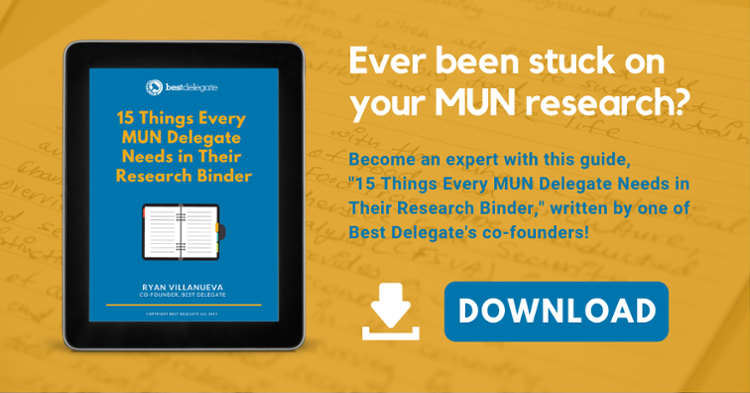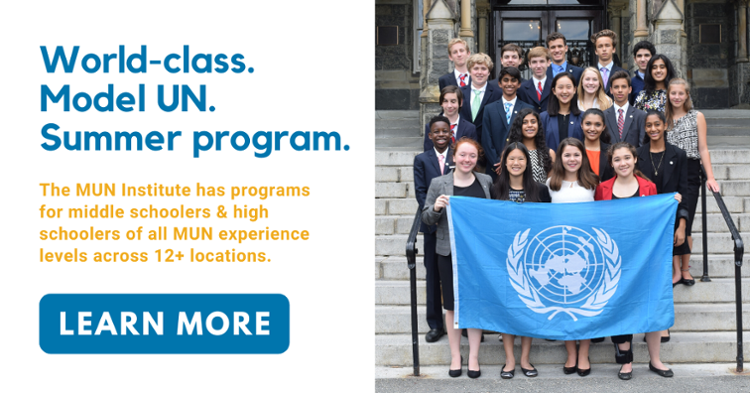This article was written as the first in a series of research guides; it was co-authored by Liza Bell and Katherine Bonner of the Best Delegate Global Media Secretariat.
Committee History and Purview
The General Assembly (GA) was established under Chapter IV of the United Nations (UN) Charter. Since the General Assembly is the main organ of the United Nations and has representation from every UN member states, it is able to discuss a wide variety of world issues. As a result of the extensive spectrum of topics discussed by the UN, the General Assembly is made up of six different committees. These committees are the Disarmament and International Security (DISEC) committee, the Economics and Financial (ECOFIN) committee, the Social, Humanitarian and Cultural (SOCHUM) committee, the Special Political and Decolonization (SPECPOL) committee, the Administrative and Budgetary committee, and the Legal committee. DISEC, the First Committee of the General Assembly, is one of the most popular GA-style committees in Model United Nations.
In light of the events in Hiroshima and Nagasaki, the first resolution by DISEC was created in 1946 to address international concerns for the “Establishment of a Commission to Deal with the Problems Raised by the Discovery of Atomic Energy.”
DISEC deals with topics that center around disarmament, global issues, and threats to peace that jeopardize international security. Under Article 11 of Chapter IV of the UN Charter, “The General Assembly may consider the general principles of co-operation in the maintenance of international peace and security, including the principles governing disarmament and the regulation of armament.”
Past DISEC Topics
These topics are intended to act as a representative sample and are pulled directly from recent high school MUN conferences around the globe.
Berkeley Model United Nations (BMUN): Cyber Warfare; Middle East Sectarian States
Global Classrooms Lebanese American University Model United Nations (GC LAU MUN): Terrorist Groups in Sub-Saharan Africa; The Issue of Biological Weapons
Harvard Model United Nations (HMUN): National Sovereignty and Asymmetric Warfare; Nuclear Weapons and Geopolitics in South Asia
Ivy League Model United Nations Conference (ILMUNC): Future of Cyber Security; Foreign Military Intervention in Internal Conflicts
Model United Nations at the University of Chicago (MUNUC): Preventing Spillover Violence in Civil Conflict; International Illicit Small Arms Production and Distribution
North American Invitational Model United Nations (NAIMUN): Satellite Warfare; Global Smalls Arms Trade
National High School Model United Nations (NHSMUN): Concerns of the Use of Unmanned Aerial Vehicles; Establishing a Nuclear-Weapon-Free Zone in the Middle East
The Hague International Model United Nations (THIMUN): Strengthening the Role of the UN Office on Drugs and Crime (UNODC) in Asian-Based Drug Trafficking; Territorial Integrity of the Former Soviet Republics; The Question of Iran’s Right to Nuclear Power; Measures to Deal with Terrorist Groups in Sub-Saharan Africa
The Hague International Model United Nations Qatar (THIMUN Qatar): Protracted Conflicts in the GUAM Area (Georgia, Ukraine, Azerbaijan, Moldova) and Their Implications for International Peace and Security; Establishing International Norms Regarding the Process of Recognition and Succession of Regime Change; The Question of Sudan and South Sudan; The Question of Limiting Arms Trade Between States That Are Not Participating in a Conflict or That Are Not Situated in Crisis Areas
Washington Area Model United Nations Conference (WAMUNC): Drone Regulation; Drug Trafficking
Common Themes and Objectives
As should be expected, the topics above are unified by their arms- and security-related subject matters. The following broad topical themes encompass a large majority of the topics listed above:
- National, Regional, and Global Security
- Biological, Chemical, Technological, and Nuclear Weapons
- Arms Trade
Key considerations when researching the topics above include national capabilities and limitations, mitigation of conflict, and oversight and monitoring mechanisms. Because of the nature of these topics, delegate research and resolution writing must be very detailed in nature and focus on the operationalization of ideas. Additionally, because of the divisive nature of many of the themes listed above, the most effective ideas and delegates will be inclusive and focus on international cooperation.
Where and What to Research
General
- The Best Delegate website has a large and helpful resource for more general research links: http://bestdelegate.com/research/.
- As with all permanent UN committees, DISEC has searchable press releases at: http://www.un.org/press/en/content/first-committee. This is an up-to-date database on what the committee has been discussing and its progress thus far. Similarly, the UN archives all past session reports and resolutions on the internet for easy access to documents: http://www.un.org/en/ga/first/archives.shtml.
- The United Nations Office for Disarmament Affairs (UNODA) has collaborated with the Netherlands to create a compilation of treaties about disarmament and other topics that are discussed by DISEC: http://www.un.org/disarmament/publications/more/treaties/disarmament-treaties.pdf. These treaties will help you gain more background on existing steps taken with regards to DISEC-relevant topics.
- If you go to the United Nations Bibliographic Information System (UNBISNET), you can find any session’s voting records to see how the country you are representing voted on past issues. This particularly helps when you are unable to find current information on your country’s position through news publications or their foreign ministry site.: http://unbisnet.un.org:8080/ipac20/ipac.jsp?profile=bib&menu=search#focus.
- The website Reaching Critical Will has analysis reports on DISEC archival information since 2002. The site organizes the voting results and provides explanation of votes by certain countries. The site also collects statements made by a variety of countries in attendance at particular sessions of the General Assembly: http://www.reachingcriticalwill.org/disarmament-fora/unga.
- Many security-related think tanks offer helpful solution-oriented scholarly articles on DISEC topics. The Council on Foreign Relations has an extensive database of these think tanks and other research-oriented organizations: http://www.cfr.org/nonstate-actors-and-nongovernmental-organizations/think-tanks-international-affairs/p32566.
National, Regional, and Global Security
- The Center for Systemic Peace has a list of all major political violence around the world from 1946 to 2014, as well as helpful sources about ongoing conflicts: http://www.systemicpeace.org/warlist/warlist.htm.
- The Uppsala Conflict Data Program (UCDP) provides a breakdown of all nations’ present conflicts, both internal and external, as well as explanations of each conflict: http://www.ucdp.uu.se/gpdatabase/search.php.
Biological, Chemical, Technological, and Nuclear Weapons
- GlobalSecurity.org offers a breakdown of existing Weapons of Mass Destruction (WMD), policies, and news: http://www.globalsecurity.org/wmd/world/index.html. It features recent press releases and reports, which will be helpful for current event research.
- The Nuclear Threat Initiative (NTI) provides a history of DISEC committee engagements on their website. The NTI also has country profiles on the past and present policies regarding nuclear, chemical, biological, and missile proliferation: http://www.nti.org/treaties-and-regimes/un-first-committee/; http://www.nti.org/country-profiles/.

A UN peacekeeper assists with the collection of surrendered illegal arms in Cote d’Ivoire.
Arms Trade
- The UN Register of Conventional Arms has an interactive map of reported arms trade as well as annual reports from the UN Secretary-General regarding global arms trade: http://www.un.org/disarmament/convarms/Register/. Similarly, the Arms Trade Treaty page includes information on the Treaty, news, and facts: http://www.un.org/disarmament/ATT/.
- The Small Arms Survey website has several links with extensive information on existing small arms definitions, data, and publications on the nuances of arms trade: http://www.smallarmssurvey.org/home.html.
Want to get the best MUN tips & resources? Check out MUN Institute Summer Camps?




